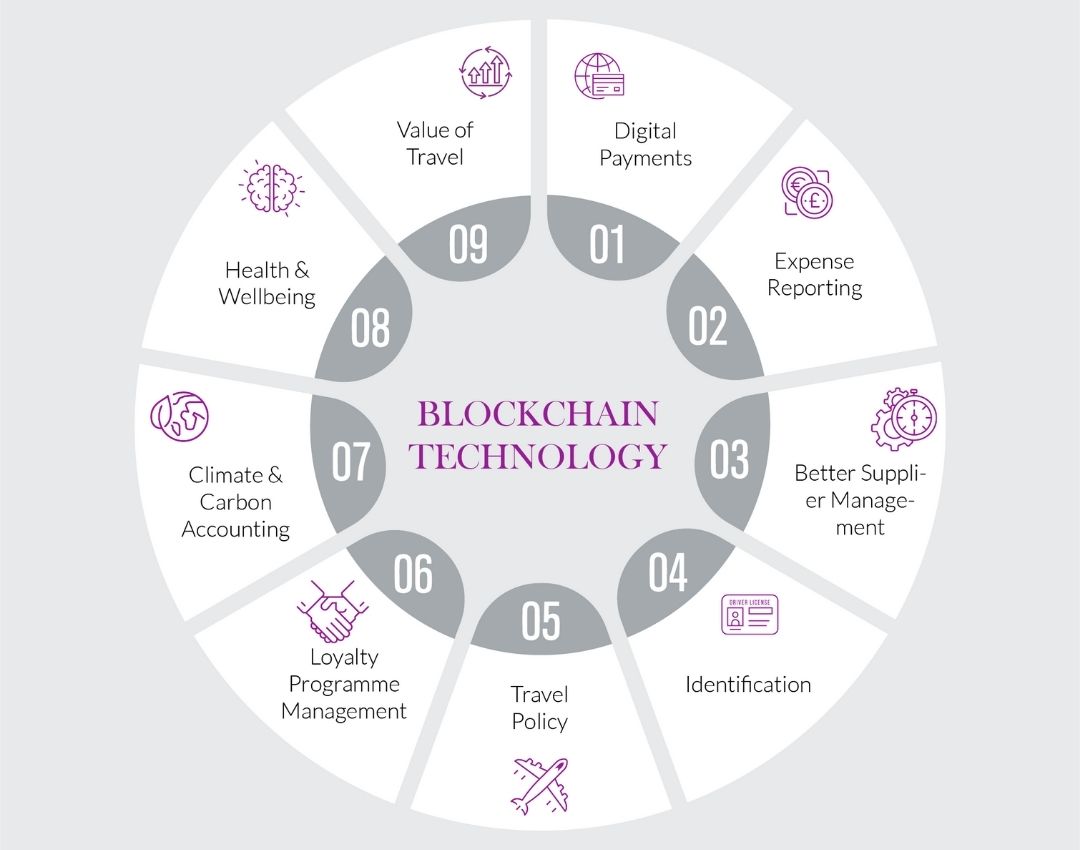Could blockchain technology revolutionise travel? We examine the areas where there’s potential for the technology to shake processes up and where even ‘killer apps’ could be developed.
Digital payments
Could instant transfers be made in the payment and settlement process? Credit card fees, for example, represent significant expense on every airline ticket sold1. Could the processing fee could be driven down using blockchain2?
Expense reporting
Blockchain could be used to account for the whole expensing process for any particular trip, instantly recording and reconciling them in one single source of truth for finance teams.
Better supplier management
Hotels, ground transportation and events are all fragmented. Blockchain consolidates data on chains of blocks, allowing for consolidation of information and implementation of smart contracts3. For example, it can bring undisputed data together on insurance and travel trips.
Identification
Whether it’s missing luggage, tracking baggage, digital passports, visas, biometrics, vaccinations or access to events, blockchain can store ID data in an efficient, accurate and transparent manner, once security and privacy concerns are overcome4. Blockchain data could be used to verify a business traveller at any point in their journey.
Travel policy
Compliance is a big issue. Blockchain can provide a single source of the truth about a trip and whether it was compliant for managed travel, policies and insurance.
Loyalty programme management
Loyalty rewards could one day be managed across different sectors for airlines, hotels and rail on one blockchain, with all points tokenised. You could be credited with reward points instantly, redeem them easily and get refunds quickly5.
Climate and carbon accounting
Many businesses are looking to reduce their carbon footprint and business travel creates emissions. Blockchain could provide a clear, reliable, secure and transparent tracking of emissions related to corporate trips. This could help businesses set targets, be transparent about climate goals, track trips and account for reductions in a verifiable way. This could help with the adoption of electrified travel, more sustainable aviation fuels6, rail use and more.
Health and wellbeing
How many hours should an executive fly in a week, month or year? When is an upgrade to business class essential to make sure an executive’s health and wellbeing are preserved for a series of a trips? Blockchain could effectively be used to account for a person’s travelling experience. Analytics and algorithms could be applied to travel data to calculate when that person has travelled too much. It could also account for bleisure trips.
Value of travel
What value does a certain trip bring to the company? Is that trip and associated expenses really justified? Blockchain could be used to put a real value on travel more effectively by bringing together blocks of data on the complete price of a trip, with data on the value it generates to the bottom line.
Interested in finding out more?
This is an extract from the first report in our Thought Leadership series, Blockchain in travel management: the emergence of a new tech era? Download the report and share your thoughts with us on blockchain technology’s place could improve travel processes by emailing [email protected].
Sources
1 www.webintravel.com/the-long-and-winding-road-that-led-to-simard/
2 www.wns.com/perspectives/articles/articledetail/940/blockchain-and-the-new-era-of-travel-embarking-on-a-trusted-journey-to-efficiency-and-innovation
www.thestreet.com/crypto/ethereum/ethereum-2-upgrade-what-you-need-to-know#:~:text=Ethereum%202.0%20will%20implement%20a,transactions%20per%20second%20or%20more
6 https://simpleflying.com/blockchain-encourage-scaling-saf/




